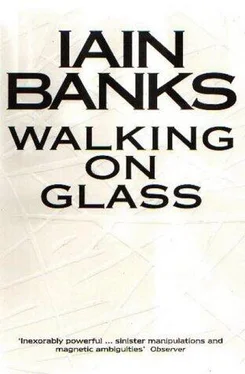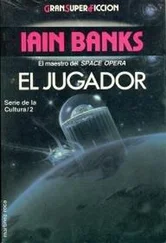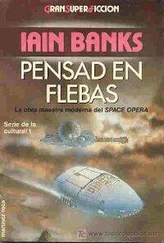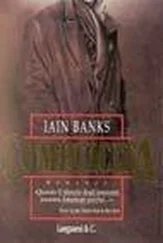"No. One missing." Quiss looked quickly over the slates.
"I might have known it. They won't let us answer the riddle now. I bet we'll have to start all over again. I bet it. That's what'll happen. This is just typical ." He turned quickly away and slammed an open palm into one of the columns, staying facing away from her, breathing deeply, head hung down between his shoulders.
Ajayi looked at him, then lifted up the small table, to see if she had placed it on top of the missing tile when she put it down to help Quiss. But the tile wasn't there. "We'll find it," she said, gazing into the drifted snow. She didn't feel as sure of it as she hoped she sounded. She couldn't understand it; the tile couldn't have bounced so far, could it? She counted the tiles on the board again, then once more.
She began to get angry; at Quiss for falling in the first place and then for trying to shove her away; at the missing tile; at the castle itself, the red crow, the seneschal, the attendants; all of them. Where could the stupid thing be?
"Are you sure you've counted them properly?" Quiss said in a tired voice, still holding on to the column.
"Of course I have, several times; there's one missing," Ajayi snapped, her voice clipped. "Now stop asking stupid questions."
"No need to bite my tongue off," Quiss said huffily. "I was only trying to help."
"Well, look for the tile," Ajayi said. She could hear herself, and she hated herself for it. She shouldn't lose control like this, she oughtn't to snap at Quiss; it did no good. They ought to be sticking together through all this, not quarrelling like schoolkids or growing-apart couples. But she couldn't help it.
"Look," Quiss said angrily, "I didn't hit the fucking board on purpose. It was an accident. Would you rather I broke my neck?"
"Of course not," Ajayi said carefully, trying not to snap or shout. "I didn't say you did it deliberately." She wasn't looking at Quiss, she was moving her head from side to side, still scanning the snow and slates, seemingly intent on finding the missing tile, but her mind was all caught up in the words; she knew she wouldn't have seen the tile even if it had been quite obvious; she wasn't concentrating on the search.
"Maybe you'd rather I did, eh?" Quiss said. "Eh?"
She looked up at him then. "Oh, Quiss, how can you say that?" She felt as though he'd kicked her. There had been no need for him to say that. What made him say such things?
Quiss just snorted. He pushed himself away from the column with one slightly shaking arm, and as he did so, the missing tile fell out of one of the bottom hems of his furs, where it had lodged when it and he fell. At the same moment a small figure appeared at the far end of the arcade, from a door which led back into the main body of the castle. They both looked first at the fallen tile, then at the small attendant. It waved and called out in an excited voice:
"Did you say, 'There's no such thing as either'?"
They looked at each other again. Ajayi tried to answer, but had to stop, and patted the top of her chest with one hand; her throat seemed to have dried up, she couldn't get any words out. Quiss nodded enthusiastically. "Yes!" he shouted. He kept nodding his head.
The attendant shook its head. "No," it said, and with a shrug disappeared back into the castle.
Somewhere far away, beneath them in the ruins, a familiar voice cackled, crowing with distant laughter.
On the corner of Maygood Street and Penton Street there was an employment office, where people went to sign on for dole money. A sign said: Door C surnames A-K, Door D surnames L-Z. Graham walked by, looking down to Half Moon Crescent itself; the curve of tall houses where Sara ffitch was living. His stomach seemed to lurch, tensing with nervous anticipation. He felt shivery, keyed up; the vaguely sultry, dulling air seemed suddenly sharpened. Colours stood out, smells (cooking, asphalt, exhaust fumes) became more vivid. The buildings - ordinary Victorian three-storey terraces, now mostly converted into flats-were strange and alien.
His heart beat faster when he saw a bike parked outside one of the houses in Half Moon Crescent, but it was outside the door next to Sara's, and it was a red Honda, not a black BMW. He took deep breaths to try and slow his heart down. He looked up at the window Sara leaned out of sometimes, but she wasn't there.
She will be there, though, he told himself. She won't be out. She will be in. And she won't have changed her mind.
He went to the entryphone. He pressed the button for her flat firmly. He waited, staring intently at the grille from which her voice would come. Very soon.
He waited.
He put his finger on the button, about to press it again, then hesitated, uncertain whether to wait a little longer or not. She might still be waking up, or having a shower; anything. There could be lots of reasons for her not answering yet. He licked his lips, kept staring at the grille. He leaned forward on the button once more, closing his eyes as he did so. He let the button go.
There was still plenty of time. Even if she wasn't in, he could wait; she would probably just be out getting something for the salad she'd said she would make for them.
He wondered whether he ought to press the button again. His stomach was feeling heavy, sick. He could just imagine someone from the houses on the corner of Maygood Street watching him now, looking at his back as he stood at the entryphone grille, waiting and waiting. The grille made a clicking noise. "Hello?" said a breathless voice. It was her!
"It -" he said, and choked on the words, throat dry. He cleared his throat quickly, "It's me. Graham." She was there, she was there!
"Graham, I'm sorry," she said. His heart seemed to sink, he closed his eyes. She was going to say she had changed her mind. "I was in the bath." The buzzer on the entryphone sounded.
He stared at the door for a moment, then at the entryphone, then at the still buzzing door. He pushed it quickly, just before the buzzer stopped sounding. The door swung open, and he went in.
There were carpeted steps down to a basement flat, a door straight ahead to the ground-floor flat. He went up the stairs; cheap but cheerful carpet, white paint on the banisters, fading pastel wallpaper. He could hear an old Beatles record being played downstairs. He got to the first-floor landing. There were more steps up to another flat, but the door on the first floor, into her flat, was open. He knocked and went in, looking around with obvious trepidation, just on the off chance it wasn't the right flat, or she hadn't meant to leave the door open. He heard water from a room to his right. Light showed under the door. "Graham?" she said.
"Hello," he called out. He put the portfolio down against the wall and closed the door on to the landing.
"Go on in, to your left." Her voice was soaked up by the sound of the running water. He took the portfolio up again, went round to his left, into a small, cluttered room with a couch, chairs, television, hi-fi, bookcases and a small coffee table; at the far end, raised up a few inches, separated from the main part of the room by small wood railings which each extended a third of the way across the area, was a kitchen section; cooker and fridge and sink, a larger table, and behind it, main curtains drawn, white lace ones floating out slightly on a faint breeze, was the window.
He put his portfolio down by the side of the couch. A small table at one end of the couch held the telephone; he recalled the time it had rung and rung, and she was under the1 bedclothes, hiding from the thunder. He crossed the room to the raised kitchen section, stepping up on to its worn linoleum surface and going to the sink. He rinsed his hands under the cold tap, splashed some water on his forehead. He dried his face and hands on a dishcloth; there was no hand towel. He was shaking.
Читать дальше












